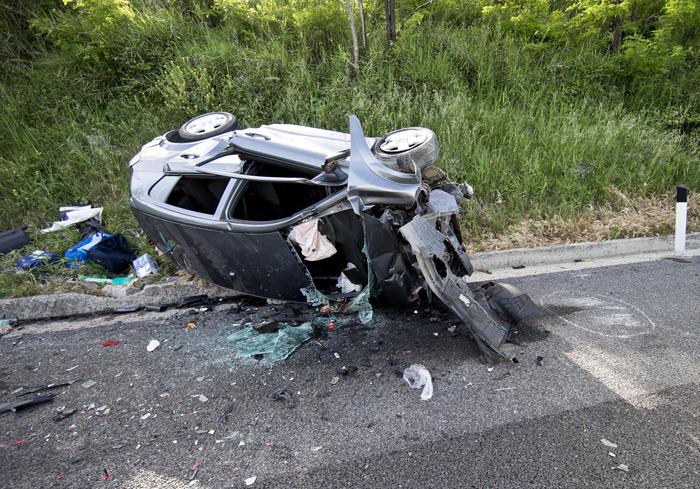Icon: enlarge
Is sharing fun?
Some car sharing providers such as Weshare set up a new interest group
Photo: Gerald Matzka / dpa
Car sharing is a niche phenomenon in Germany: Providers whose cars can be rented and parked in a business area (free-floating) have 14,200 vehicles.
Companies that park their vehicles in permanent parking spaces have almost 12,000 vehicles.
With almost 50 million private cars, the industry looks like a delicate plant.
Nevertheless, car sharing is seen as a beacon of hope for the traffic transition.
Experts expect that city dwellers in particular will increasingly be able to do without their own car if there are enough vehicles to share.
That would save space and resources.
After all, the number of users has grown significantly, a total of 2.87 million people are registered with one provider, the majority of them - around 2.1 million - being free-floating providers.
However, the sharing industry is currently unable to represent its interests powerfully and with one voice.
Three large free-floating providers - Miles, the VW subsidiary Weshare and the joint Daimler and BMW subsidiary Share Now - have founded their own interest group, together with the e-scooter rental companies Bird, Dott, Lime, Tier, Spin and Voi.
Both sides are vying for influence
This "Shared Mobility Platform" (PSM) is now in opposition to the traditional Federal Association of Carsharing (BCS).
It mainly organizes operators of station-based systems such as Cambio and Stadtmobil.
The differences of opinion with the freefloaters were apparently too great for a joint association.
Now both sides are fighting for influence and want to be heard by politicians.
But there is also a battle raging over whose system is better for the environment.
"It was already noticeable in previous discussions that both car sharing cultures are having a hard time coming together," explains Michael Creutzer, Managing Director of BCS member Teilauto.
Station-based providers fundamentally questioned the ownership of a private car.
Freefloating providers are growth-driven, where profits and risk capital play a role, says Creutzer.
"We, on the other hand, want environmentally conscious traffic behavior, not primarily looking for returns."
Law in Berlin exposes wounds
The other side also feels the cultural difference.
"We feel better in today's society," explains the boss of PSM founding member Miles, Oliver Mackprang.
The BCS represents the interests of the stationary providers.
They once started with pen and logbook and often carry ecological awareness before them.
Apparently that doesn't always go with the app-savvy freefloaters.
However, there is also a specific reason for the division: the planned road law in Berlin.
In this way, the administration could classify the sharing operation as a special use of the road in the future - and charge cars, bicycles and e-scooters from sharing services with a special usage tax if they are in public space.
"The flexible providers are now annoyed that the BCS does not support them in the fight against this law," says Andreas Knie, traffic researcher at the Science Center Berlin.
Therefore, it makes sense to found their own association from their perspective.
Municipalities make it more difficult for free floaters
The law is absurd for knees.
“This tax is completely out of date, since private cars continue to park for free.” The tax would primarily affect two- and four-wheeled freefloaters.
Station-based providers would hardly be affected by this; their vehicles are mostly on private land.
Freefloating providers are not only threatened with hardship in Berlin.
The Higher Administrative Court in Münster announced that municipalities are allowed to limit the number of sharing vehicles in public spaces and to set specifications for business areas.
Influencing such regulations is an essential purpose of the new association, explains Friedemann Brockmeyer of the consulting firm Civity.
Miles boss Mackprang suggests that the planned law in Berlin actually played an important role in the founding of the PSM.
Expert: "BCS is fragmented and backward-looking"
In the eyes of traffic researcher Knie, the older of the two associations is not accessible for modern political issues.
“The BCS is fragmented and backward-looking,” says the researcher, and criticizes the “one-sided” focus on the thesis “that the station-based model is the right model for abolishing as many cars as possible”.
Scientifically speaking, this statement is not very robust.
But Sharenow and Co. also give him cause for criticism.
"The freefloaters have not been overly involved in politics so far," complains Knie.
At the same time, for a long time they had a slightly arrogant attitude towards the station-based providers.
In the end, their way to the BCS was blocked until the end.
"There are clear ecological criteria for inclusion in the BCS, you have to prove a relief effect," explains Teilauto managing director Creutzer.
The free-floating offers did not succeed.
Both associations try to declare themselves to be the good ones with scientific studies.
In 2018, the BCS pointed out that, according to a study, free-floating had no significant relieving effect on traffic.
The PSM, on the other hand, refers, among other things, to a study from 2016 according to which respondents in both systems eliminated at least one car in their household through car sharing.
Cooperation does not seem entirely out of the question, despite the formation of blocks, Miles boss Mackprang is open.
Teilauto managing director Creutzer also seems open-minded.
He could imagine a joint association with different criteria.
"We should work together to ease the burden on the streets."
In its fresh annual statistics, however, the BCS once again placed a peak against Weshare, Sharenow and the like.
Car sharing is offered at 855 locations in Germany, it says.
“This spatial distribution of car sharing, which is outstanding in an international comparison, is provided entirely by station-based car sharing offers”.
Freefloating car sharing, on the other hand, is growing “on existing space” in the large metropolitan regions.
To put it simply: We go where it hurts.
You stay in the comfort zone.
Icon: The mirror





/cloudfront-eu-central-1.images.arcpublishing.com/prisa/O5KJZWDZ2ZF3PMFCA7GSGYAIW4.jpg)



